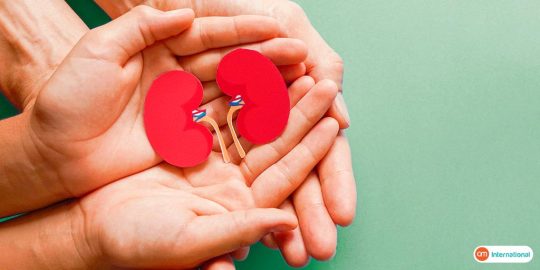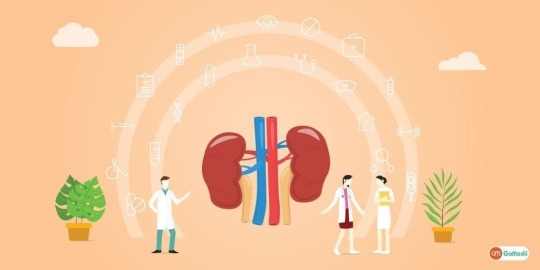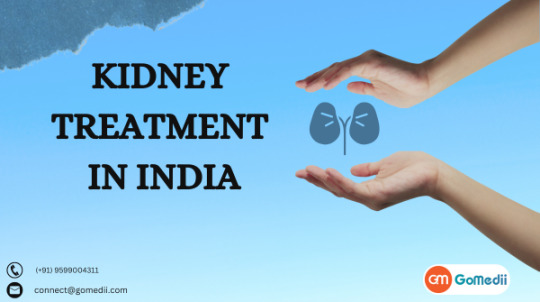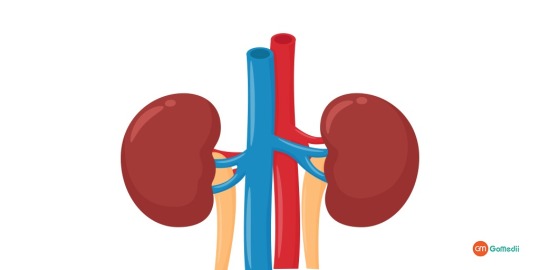#kidneytreatmentdoctors
Text
Kidney Transplant Treatment in India
In the field of medical breakthroughs, Kidney Transplant Treatment in India stands as a beacon of hope and renewal. As the page suggests, this transformative procedure has the power to turn the tide for those grappling with kidney failure, offering them not just a treatment but a second chance at life.
Read more: The Pinnacle of Kidney Transplant Treatment in India
#kidneytransplant#kidneytreatmentdoctors#kidneytreatmentexperts#kidneytreatmenthospitals#kidneytransplantdoctors#kidneytransplantexperts
0 notes
Text
What Are The Best Kidney Treatments In India?

Determining the best kidney treatment in India involves considering various factors, including the specific kidney condition, the patient's individual health, the expertise of healthcare providers, and the available treatment options. India is known for its world-class medical facilities and highly skilled medical professionals, making it a popular destination for kidney treatment. Let's explore some of the top kidney treatment options in India.
Kidney Transplantation:
Kidney transplantation is often considered the most effective treatment for end-stage kidney disease (ESKD). India has a thriving kidney transplant program with well-established transplant centers in cities like Chennai, Delhi, Mumbai, and Hyderabad. Renowned hospitals and transplant surgeons in India have successfully performed numerous kidney transplants, including living donor and deceased donor transplants. The success rates for kidney transplantation in India are generally high, and the procedure offers the potential for a better quality of life. Hemodialysis and Peritoneal Dialysis:
Dialysis is a life-saving treatment for individuals with advanced kidney disease. India has a vast network of dialysis centers that provide both hemodialysis and peritoneal dialysis services. These centers are equipped with state-of-the-art dialysis machines and offer high-quality care. Patients can undergo regular dialysis sessions to manage their kidney condition and maintain overall health. Laparoscopic Nephrectomy:
Laparoscopic nephrectomy is a minimally invasive surgical technique used to remove a diseased or non-functioning kidney. It involves smaller incisions, reduced post-operative pain, and quicker recovery compared to traditional open surgery. Leading hospitals in India have experienced urologists and surgeons who perform laparoscopic nephrectomy with precision. Treatment for Kidney Stones: India has skilled urologists who specialize in the diagnosis and treatment of kidney stones. Various treatments, including shockwave lithotripsy, laser lithotripsy, and minimally invasive surgeries, are available to manage kidney stones effectively. Patients with kidney stones can receive comprehensive care and guidance on dietary and lifestyle changes. Pediatric Kidney Care: India also excels in pediatric nephrology and offers advanced treatments for kidney conditions in children. Leading pediatric hospitals provide specialized care for young patients with congenital kidney disorders, kidney infections, and other kidney-related issues. Treatment for Chronic Kidney Disease (CKD): Managing CKD involves a combination of medication, lifestyle modifications, and close monitoring. Nephrologists in India work with patients to slow the progression of CKD and prevent complications. They provide guidance on diet, medication, and regular check-ups to maintain kidney function. Medical Tourism: India is a hub for medical tourism, attracting patients from around the world. The cost of kidney treatment in India is often more affordable than in many Western countries, making it an attractive option for international patients seeking high-quality care. Ultimately, the "best" kidney treatment in India depends on the specific diagnosis and individual circumstances. It is crucial for patients to consult with experienced nephrologists and urologists who can assess their condition and recommend the most appropriate treatment plan. India's healthcare infrastructure, skilled medical professionals, and range of treatment options make it a top destination for kidney care.
#kidneytransplant#kidneytreatmentdoctors#kidneytreatmentexperts#kidneytreatmenthospitals#kidneytransplantdoctors#kidneytransplantexperts#kidneytreatmentinindia#kidneytreatmentcostinindia#costofkidneytreatmentinindia#kidneytreatmentinindiacost#affordablekidneytreatmentinindia
0 notes
Text
Kidney Treatment Cost in India

Kidney disease means there is damage to your kidneys; hence aren’t working properly. Many kidney conditions are “chronic” because the kidney function worsens over time.
Read More: Kidney Treatment Cost in India
#kidneytreatmentcostinindia#kidneytreatmentdoctors#kidneytreatmentexperts#kidneytransplantininida#kidneytransplanthospitals
0 notes
Text
Prevention of Kidney Failure and Diseases

Cases of kidney damage are being diagnosed with high frequency. There can be many reasons for kidney failure, which can be due to unhealthy habits or lifestyle. In this blog, I will talk about some such habits and their effects on the kidneys.
(People Also Like to Read: Kidney Treatment: Nurturing Your Kidneys for Optimal Health)
You will also find out how you can keep the organ healthy, through a conscious effort to adhere to avoid behavioral patterns that negatively affect the kidney's functionality.
The kidneys are like two bean-shaped organs that extract waste and toxins from the bloodstream and balance the fluids within the body. It also forms urine and performs other essential functions like regulation of blood pressure through the salt and water balance, and aid in red blood cell production in the body.
The kidneys are located on each side of the spine in the back muscles below the rib cage.
There are common symptoms that indicate a problem with the kidney organ like a change in color and quantity of your urine, dizziness, fatigue, breathing challenges, and sudden pain in the body.
The Following Are Common Habits That Could Damage The Kidney:
1. Insufficient intake of water: A body of water has many functions and there is no substitute for it. Consuming carbonated or energy drinks cannot meet the requirement of water as dehydration usually leads to kidney damage. Kidneys remove metabolic waste from the body and regulate erythrocyte production.
However, if the blood thickens due to a lack of sufficient water, it impairs the kidney's ability to eliminate toxins in the body. Therefore, the kidneys need to be properly hydrated in order to perform their functions properly.
2. High Salt consumption: Although intake of salt is essential to the body, too much consumption of salt can cause damage to your kidney. It's important to curtail the amount of salt you add while cooking as it could seriously threaten your health and kidney. The kidney metabolizes 95% of the sodium taken through food consumed, and the kidney works harder to extract the excess salt if it's high.
This could reduce the functioning of the kidney as it becomes strained due to the work pressure exerted on it and the result is retention of water in the body. A consequence of water retention is an increase in blood pressure and the risk of kidney disease or failure. You should be mindful of how much salt you consume and your choice of diet.
3. Filled-up bladder: It's important to empty the bladder no matter the number of times you have to use the restroom for that purpose. The urge to urinate is a signal from the body to get rid of toxic waste, and when you delay this pressure urge, it could result in kidney failure. Urine contains bacteria and when it stays in the bladder more than necessary these bacteria could multiply which could cause a kidney infection or a urinary tract infection.
4. Excessive drinking of Alcohol: Excessive drinking can cause serious kidney damage. If you must drink, do so in moderation. My doctor friend advises complete abstinence from drinking alcohol. However, you can occasionally drink red wine as it has been shown to be beneficial for heart health. Excessive consumption of alcoholic beverages causes uric acid to accumulate in the tubules of the kidneys, causing tubular obstruction.
5. Cigarette smoking: Lots of research by medical practitioners contends that smoking is bad for all organs of the body, including the kidneys. Different health challenges are associated with smoking of cigarettes and kidney disease is not an exception. Smoking reduces the blood flow in the body as it constricts the blood vessels in the kidneys.
6. High Protein diet: Enormous intake of food containing protein like red meat, and other forms of animal protein can increase the risk of developing kidney disease.
7. Use of Analgesics: If you are fond of taking pain relievers, especially without a medical prescription then it's time to stop. Consuming any form of analgesics to reduce pain, inflammation, or feverish condition should be done with the prescription of a physician. Research shows that long-term use of analgesics without a prescription may reduce the flow of blood to the kidneys and result in kidney failure.
8. Ignoring infections: You could have damage to your kidneys due to common infections like cold, cough, the flu, and tonsillitis amongst others. These common diseases have bacteria or viruses that can damage your kidneys if not treated in time. It goes without saying that you should treat common infections appropriately and immediately to avoid any further breakdown of your health.
9. Lack of sleep: The benefits of sleep to health should not be overlooked. You need an average of 7 hours of sleep every day to stay fit and healthy. Organ tissues go through a renewal process while you sleep, so the lack of sleep disrupts this normal process which could result in damage to the kidney and other vital organs. Sleeplessness may also cause high blood pressure so it's better to adopt a healthy sleeping lifestyle that would enhance your health.
(People Also Like to Read: Renal Cyst Treatment: Options and Considerations)
10. Lack of exercise: Exercise is an excellent means of staying healthy, and it improves your level of fitness and well-being. Studies reveal that people who exercise regularly have lower risks of developing kidney diseases in comparison to others who have engaged in little or no form of exercise.
#kidneytreatmentdoctors#kidneytreatmentexperts#kidneytransplantininida#kidneytransplanthospitals#kidneytreatmentcostinindia
0 notes
Text
Kidney Treatment in India

Kidney disease is a condition that affects the function of the kidneys, which are essential organs that filter waste outcomes from the blood and regulate the body’s fluid balance, electrolyte levels, and blood pressure.
See More: Kidney Treatment in India
0 notes
Text
Kidney Treatment In India

Kidney disease means there is damage to your kidneys; hence aren’t working properly. Many kidney conditions are “chronic” because the kidney function worsens over time. Many kidney diseases can lead to kidney failure also called end-stage kidney disease. At this point, you’ll need dialysis (artificial filtering) or a kidney transplant.
Read More: Kidney treatment In India
#kidneytreatmentdoctors#kidneytransplanthospitals#kidneytreatmentexperts#kidneytransplantininida#kidneytreatmentinindia
0 notes
Text
Kidney Treatment In India

Medical tourism in India has seen a major increase in recent years, as the international community has noticed the affordable yet state-of-the-art renal and kidney healthcare provided in India.
Read also: Kidney Transplant
#kidneytreatmentinindia#kidneytransplantininida#kidneytreatmentexperts#kidneytreatmentdoctors#kidneytransplanthospitals
0 notes